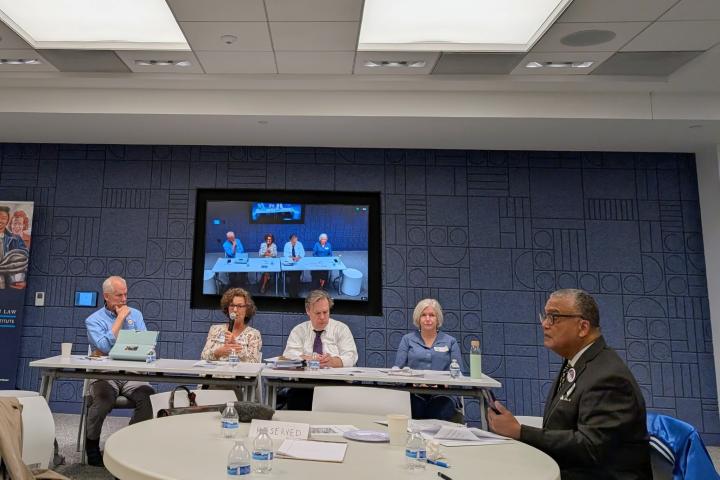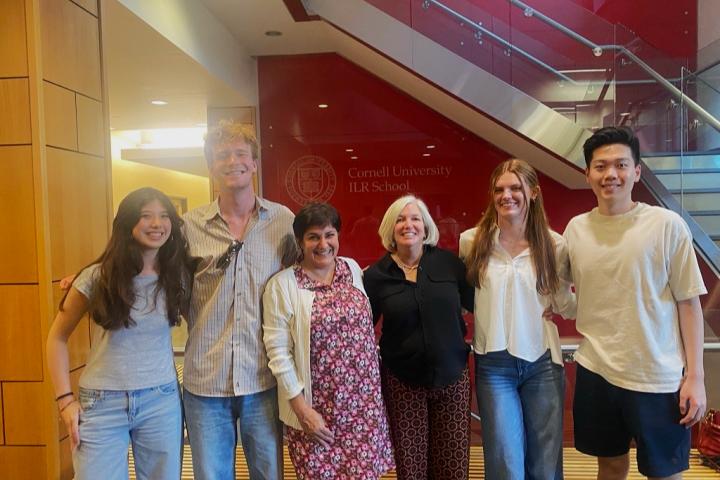
Celebrating 70 Years
When she was 19, Lois Gray said she knew she wanted to go into labor relations, something her professors thought was “far-fetched.”
Seven decades later, Gray, who served as the first director of ILR extension in its Buffalo office, is regarded as a pioneer in the field.
She shared her perspectives as part of panel discussion at a 70th anniversary celebratory event Thursday in Buffalo that was attended by Cornell and ILR School administrators, faculty and staff, and Buffalo dignitaries and community leaders.
Gray, the Jean McKelvey/Alice Grant Professor of Labor Management Relations Emeritus, said she had read about the ILR School being established by the New York State Legislature. She contacted faculty at the school, including the legendary Professor Maurice Neufeld, asking about graduate programs she might pursue.
“They told me they didn’t have any graduate programs, but asked me if I would be interested in quitting my job and establishing ILR’s first extension office in Buffalo,” which she did in 1946. Gray now works in ILR’s New York City offices.
Panelists talked about the growth of ILR’s Buffalo work, which has evolved from providing public lectures and free classes to fee-for-service in-person, online and customized programs on a variety of work and employment topics including labor-management relations, union leadership, and workplace health and safety.
Gray said ILR continues to be responsive to changes in society by putting a programmatic focus on urban problems such as poverty, as well as on community and economic development.
Harry Katz, Jack Sheinkman Professor and former ILR dean, spoke about the High Road Fellowships program that took shape eight years ago under his leadership and “opened a door for students to engage with social and economic issues.”
The program involves students in summer internships focused on community and economic development initiatives. He credits Lou Jean Fleron, High Road director, extension faculty emeritus and organizer of the 70th anniversary event, with driving the program and helping it to flourish.
“In 1985, when I first came to ILR, I was studying the auto industry and Lou Jean invited me to Buffalo to learn more about extension and what they were doing,” Katz said at the Market Arcade event in downtown Buffalo.
“What I’ve learned is that the interaction between the Ithaca campus and our faculty researchers and the world of work is two way. Faculty learn what’s going on now in practice and how this might tie to research we do, and academics can provide additional insight into problems people in the workplace are wrestling with.”
“Faculty on the Cornell campus need to see extension as a resource not just for them, but for their students, as a great way to get into the field and test ideas,” Katz said.
Fleron said that a connecting theme for all of ILR’s programs in Buffalo, and extension programming more broadly, is an emphasis on “making the economy work for everyone.”
Buffalo is an ideal place to do this work, she says, because “it’s a solidarity city a place where you can get to know people and make a difference. We’ve developed a strong learning network here and can continue to be innovative.”
Linda Barrington, associate dean of outreach and sponsored research, also discussed the important role the Buffalo operation plays in ILR extension and outreach work.
“The school is focused on helping organizations come to terms with the new economy and the way people are working now,” Barrington said. “Everything we’re doing in Buffalo makes it a great place to find these answers.”
Cornell Vice Provost Judy Appleton, who also attended the event, praised ILR, calling the program in Buffalo “highly evolved and a model of what we hope to see more broadly at Cornell” and in its public engagement efforts.
In reflecting on her 70 years with ILR, Gray said she has “many happy moments” thinking back on her time in Buffalo, where she started her career and met her husband.
“Buffalo has been a model and testing ground for the kind of professional programs we see at ILR in New York City and across the school. I’m thrilled to have had the opportunity to be with Buffalo from the beginning, and I’m optimistic about the future of extension in Buffalo,” she said.
Fleron added, “Our future in Buffalo is as bright as our remarkable past.”
At the reception following the panel discussion, Buffalo Mayor Byron Brown and Deputy County Executive Maria Whyte issued proclamations declaring March 31 Cornell in Buffalo Day and Cornell in Erie County Day.



